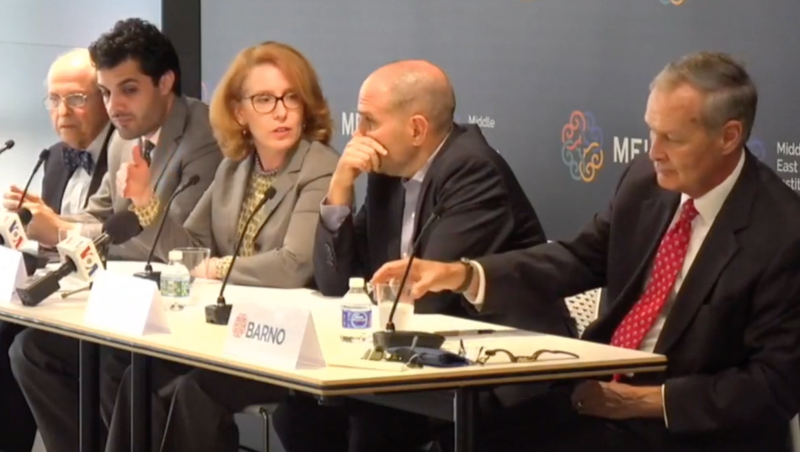
Pakistan is on track to become an important U.S. key strategic partner following the U.S. troop withdrawal from Afghanistan according to a “prediction” by former acting special representative for Afghanistan and Pakistan Laurel Miller, she was speaking on an expert panel titled, ‘assessing the Implications of a U.S.- Taliban deal’ at the Middle East Institute (MEI), a Washington D.C., based think tank; the event was co-sponsored by INDUS, a Pakistani diaspora led think tank.
Following nine rounds of talks between the United States and the Taliban for peace negotiations in Afghanistan, U.S. MEI Director for Afghanistan and Pakistan, moderator Marvin Weinbaum, questioned the impact the eventual U.S. withdrawal from Afghanistan will have on U.S. strategic interests in the region.
Miller said, “the U.S. will look to step back up to some degree its military relationship with Pakistan. The U.S. will look to Pakistan as a significant counter-terrorism partner in the region.”
Initially, she explained the U.S. will seek “the first option for the U.S. to have a reliable and capable partner in Afghanistan,” but she said “if that is not a long term solution…. then my prediction…” she emphasized, “not a policy recommendation” the U.S. would turn to Pakistan to partner work with them in the region -- as they have previously.
She added, “I suspect once a U.S. withdrawal finally happens, we will hear the pentagon say…. even those who said we need to maintain a presence will shift their narrative to – ‘we can look after this form over the horizon’.”
But she added “there will be a desire to have a relationship on the ground within the region.” That is when she predicted the U.S.-Pakistan relationship in the region will be resurrected, “if the Pakistan and Afghanistan area looks to be a fertile ground for terrorist groups, “she said, “then I suspect the U.S. will look again to Pakistan.”
Senior Fellow at the Carnegie Endowment for International Peace, Jarett Blanc, echoed Millers views. Blanc distinguished between the geostrategic and counterterrorism areas that were going to drive the strategic outcomes in the region.
He explained that from a geostrategic perspective U.S interests are only served by a withdrawal from Afghanistan as the U.S. military was limited in scope, “our troops are hostage to the G locks and the A lock in Pakistan…” he said, “we have no choices with our relationship with Pakistan if that becomes the necessary form of objective in our relationship.” Although if the U.S. leaves Afghanistan, this opens up the possibility for a different course in the U.S.-Pakistan relationship.
Blanc agreed with Millers “prediction” for resurrecting the U.S.-Pakistan military relationship in the region.
Eds: This event was held before President Trump cancelled the talks.
Following nine rounds of talks between the United States and the Taliban for peace negotiations in Afghanistan, U.S. MEI Director for Afghanistan and Pakistan, moderator Marvin Weinbaum, questioned the impact the eventual U.S. withdrawal from Afghanistan will have on U.S. strategic interests in the region.
Miller said, “the U.S. will look to step back up to some degree its military relationship with Pakistan. The U.S. will look to Pakistan as a significant counter-terrorism partner in the region.”
Initially, she explained the U.S. will seek “the first option for the U.S. to have a reliable and capable partner in Afghanistan,” but she said “if that is not a long term solution…. then my prediction…” she emphasized, “not a policy recommendation” the U.S. would turn to Pakistan to partner work with them in the region -- as they have previously.
She added, “I suspect once a U.S. withdrawal finally happens, we will hear the pentagon say…. even those who said we need to maintain a presence will shift their narrative to – ‘we can look after this form over the horizon’.”
But she added “there will be a desire to have a relationship on the ground within the region.” That is when she predicted the U.S.-Pakistan relationship in the region will be resurrected, “if the Pakistan and Afghanistan area looks to be a fertile ground for terrorist groups, “she said, “then I suspect the U.S. will look again to Pakistan.”
Senior Fellow at the Carnegie Endowment for International Peace, Jarett Blanc, echoed Millers views. Blanc distinguished between the geostrategic and counterterrorism areas that were going to drive the strategic outcomes in the region.
He explained that from a geostrategic perspective U.S interests are only served by a withdrawal from Afghanistan as the U.S. military was limited in scope, “our troops are hostage to the G locks and the A lock in Pakistan…” he said, “we have no choices with our relationship with Pakistan if that becomes the necessary form of objective in our relationship.” Although if the U.S. leaves Afghanistan, this opens up the possibility for a different course in the U.S.-Pakistan relationship.
Blanc agreed with Millers “prediction” for resurrecting the U.S.-Pakistan military relationship in the region.
Eds: This event was held before President Trump cancelled the talks.
